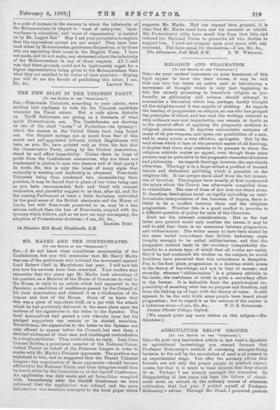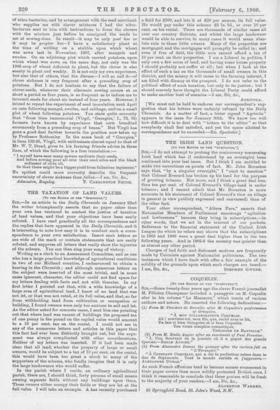AGRICULTURE BELOW GROUND.
[To T H IC EDITOR OF PHI " SPROTATOR.1 Sia,7-In your very instructive article in last week's Spectator on agricultural bacteriology you remind farmers that Professor Bottoinley's method of conveying nitrogen-fixing bacteria to the soil by the inoculation of seed is at present in an experimental stage. You offer the salutary advice that farmers are not only the proper people to conduct experi- ments, but that it is much to their interest that they should do BO. Perhaps I am already amongst the converted. So disappointing of late years has been the failure of clover- seeds sown on cereals in the ordinary course of alternate cultivation, that last year I availed myself of Professor Bottoniley's advice. Through Mr. Stead, I procured packets
of nitro-bacterine, and by arrangement with the seed merchant who supplies me with clover mixtures I had the nitro- bacterine sent to him with instructions to dress the clovers with the mixture just before he consigned the seeds to me at sowing-time. In result—it may be only post hoc or it may be propter hoc—I have a satisfactory plant at the time of writing on a stubble upon which wheat was sown last in November, 1907, after mangels and swedes. On an adjoining plot which carried potatoes, upon which wheat was sown on the same day, not only was the 1908 crop of wheat deficient in plant, but the clover is also scanty in plant and weakly. It is not only my own experience, but also that of others, that the disease—I will so call it—of clover sickness is very frequent after a preceding crop of potatoes. But I do not hesitate to say that the failure of clover-seeds, whenever their alternate sowing occurs at as short a period as four years, is so frequent as to induce me to intermit seeds for about six instead of four years. However, I intend to repeat the experiment of seed inoculation next April on oats following mangel, swedes, and cabbage, and on a small plot of wheat following potatoes. You state quite correctly that "from time immemorial (Virgil, 'Georgics,' 1,, 73, 76) farmers have known by experience that corn benefited enormously from a preceding crop of beans." But Virgil has gone a good deal further towards the position now taken up by Professor Bottomley. In the same book of "Georgics," in lines 193-95, Virgil, with enthusiasm almost equal to that of Mr. W. T. Stead, gives to his farming friends advice in three lines, of which the following is a free translation :— "I myself have soon many sowers medicate their seeds, And before sowing pour all over their seed nitre and the black sediment of olive oil, So that there might be a bigger yield from fallacious legumens."
No epithet could more correctly describe the frequent uncertainty of clover sickness than fallax.—I am, Sir, &c.,










































 Previous page
Previous page